Introduction to Lion’s Mane Mushroom Myths and Misconceptions
Ah, the Lion’s Mane mushroom! Just the name of this fungus stirs up a sense of mystery and intrigue. But hold your horses, buddy! Before you dive headfirst into the world of this mythical medicinal mushroom, let’s take a peek behind the curtain. There’s a mixed bag of fact and fiction surroundin’ this mane mushroom. From the downright dubious to the somewhat believable, Lion’s Mane myths have managed to permeate the pages of the medicinal mushroom encyclopedia. So, let’s chew the fat and debunk common misconceptions about this shaggy specimen, which—despite its somewhat fearsome name—is far from ferocious.
First off, let’s pop a hole in the myth that the effects of Lion’s Mane mushrooms can cure any ailment under the sun—from the common headache to more complex autoimmune diseases. Now, don’t get me wrong, this shiitake ain’t all hot air! Lion’s Mane has been used as a therapeutic medicine and dietary supplement for hundreds of years, particularly in traditional Chinese and Japanese medicine. Yet, although research suggests it may provide a veritable cornucopia of health benefits, such as potentially lowering blood sugar levels in those with diabetes and offering relief from depression and anxiety, it’s no magic bullet. And let’s nix the misconception that all mane mushroom products are equal. They range from potent extracts and capsules to culinary concoctions such as teas and powdered supplements, each with their own bioavailability and dietary efficacy:
– Mushroom extracts: These are the Mack Daddies of medicinal mushroom products! Extracts from Lion’s Mane, Reishi, Chaga, and even Turkey Tail offer a range of antioxidant and anti-inflammatory properties.
– Capsules: Convenient, sure, but they might not pack the punch of a pure extract. Even so, they’re a swell way to incorporate potential benefits of Lion’s Mane mushrooms into your routine, in moderation, of course.
– Culinary uses: Lion’s Mane has a meaty texture and a savory taste akin to lobster. Useful if you fancy a fungus-infused feast, but may not deliver the high concentration of beneficial polysaccharides found in extracts.
Basically, the mane mushroom may support health and wellness, but more research is needed to better understand its full therapeutic potential. However, it’s important to remember that what works like gangbusters for your Aunt Sally may send Cousin Joe running for the hills with an allergy. So, as with any supplement, while Lion’s Mane is generally safe, it ain’t a one-size-fits-all solution.
Common Myths and Misconceptions about Lion’s Mane Mushroom
Ah, the Lion’s Mane mushroom– an amazing organic cure from Mother Nature’s basket, with a shaggy, white, tufted appearance that’s hard to miss–has got some serious chit-chat surrounding it. People often spin sugary tales about its almost magical, holistic healing properties, contributing to everything from tickling up heart health to increasing sleep quality. These stories are as common as muck, but sadly, many of them are about as useful as a chocolate teapot! Yet then, there’s a pinch of truth within their lines. Scientifically speaking, Lion’s Mane mushrooms and their extracts do show potential health benefits such as reducing inflammation and blood pressure. But hang on, that’s not the entire story!
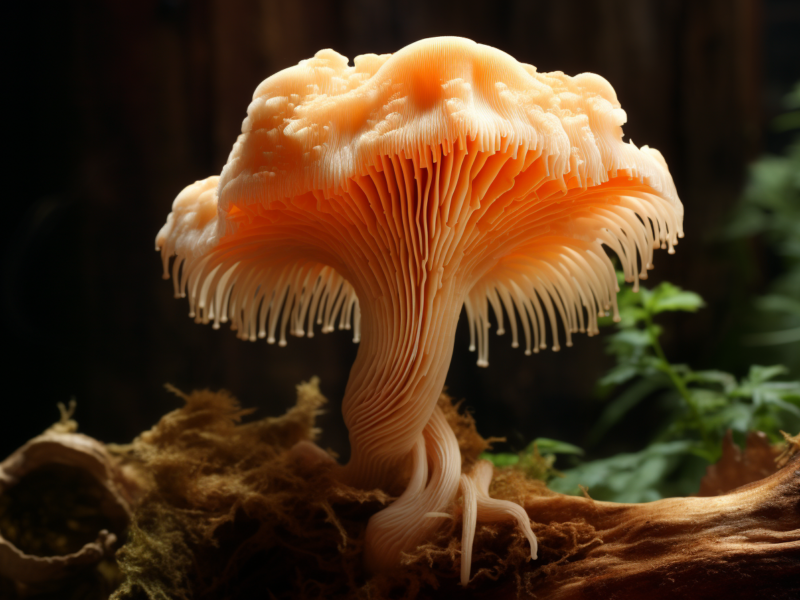
Despite these feel-good rumors, the cold hard truth is that there’s barely enough evidence to support such big claims. Taking lion’s mane mushroom extract doesn’t equate to kissing inflammation or heart disease goodbye in humans–not by a long chalk! Of course, you can’t dismiss mane mushrooms out of hand: like their fungal kin, the maitake and chaga mushrooms, they pack a nutritional punch and are organically high in antioxidants.
In real rat and mycelium studies, mane has even been seen to stimulate apoptosis, or cell death in tumors. However, it’s not a silver bullet for any and all ailments.
Here are some common myths and misconceptions about Lion’s Mane mushrooms:
– It’s touted as a miracle cure for digestive issues. Just so we’re clear, while some might feel like their stomach’s doing the tango after a ginger-infused Lion’s Mane meal, there’s no concrete source to back up claims about its detoxifying powers.
– You’ll often hear that it can decrease physical and mental aging. Mind you, the lifespan of folks in the past 80 years hasn’t skyrocketed with mushroom supplements.
– Lion’s Mane continually gets compared to additives like ethanol. A classic case of comparing apples to oranges, or in this case, mushrooms to liquids!
So folks, let’s take these myths with a grain of salt. After all, even if Lion’s Mane isn’t the panacea some make it out to be, it at least wins a brownie point for being versatile and nutritious!
Lion’s Mane as a Psychedelic Mushroom
Ah! Now, here’s a twist to the tale of the humble Lion’s Mane – an exploration into its potential as a psychedelic mushroom. Admittedly, we are more at home rhapsodizing on such delights as the earthy oyster or the fiery sharpness of ginger, but we must, as they say, boldly go where few have trod. However, remember that the Lion’s Mane isn’t simply a one-trick pony; it’s laden with an array of not-so-common advantages. Hold your horses, we aren’t finished yet; this fungi comes with its own dose of troubles too, especially for those unlucky folks who find themselves facing its not-so-friendly side effects.
Where was I? Ah, yes! Within the strange and wonderful world of the Lion’s Mane, the first thing that grabs our attention is its antioxidant properties. Quite impressive, I must say. It’s a magic bullet in many ways, designed primarily to inhibit damage caused by those pesky free radicals floating around in your body. But folks, remember how I mentioned “those who experience?” Well, that applies here. Many people who experience the raw power of the Lion’s Mane report various benefits like enhanced cognitive function, sharper memory, and even an improved sense of well-being. But the psychedelic effects? Well, they are still a hot topic of debate in the science world. Before you run off thinking this is the next big thing, let me lay out some of the potential setbacks:
– Possible allergic reactions
– Mild nausea
– Itchy skin
Yikes, right? but, hey, all good things come with a pinch of salt, don’t they? It’s all about knowing what you’re trading off for what. So keep your wits about you and always do your own research. After all, picking up the wrong mushroom could leave you in quite a pickle!
Dosage related Myths
Well, folks, buckle up as we dive head-first into a whirlpool of dosage-related myths! You know how the saying goes, “What you don’t know can’t hurt you.” But hang on a second, when it comes to medication doses, that’s a load of old hogwash. While ignorance may seem like bliss, it can indeed harm us, or worse, be a highway to disaster. There are widely spread misconceptions flying around about medication dosages, often clouded with half-baked truths and misguided intentions, resulting in unwanted pitfalls or even health escalation.
Now, it’s high time we shine a solid spotlight on these misconceptible hogwash tales – those that often leave folks like you and me hanging in the balance. Arguably, the most common myth floating around is – “Taking more medication means faster recovery.” Holy smokes, it’s essential to realize that this notion couldn’t be further away from the truth. Medication dosage isn’t about taking two steps forward; it’s about striking the right balance between the myriad benefits and possible side effects.
Each medicine comes with its:
• Right dose
• Right time
• Right routeIt’s like baking a cake; throwing in too much of this or cutting short on that won’t result in a tastier cake. Instead, it’s the recipe for disaster.
So, to sum it up, folks, stick to the prescription, be patient, and let the brew do its magic!
Lion’s Mane Causes Frequent Headaches
Oh dear! Just when we’re about to hit the hay praising the benefits of Lion’s Mane, a mushroom supplement, bam! It seems to have a sordid love affair with causing headaches. Known for its cognition-boosting properties and potential to slay neurodegenerative diseases, this fungi player isn’t playing fair, folks. Unfortunately, with every rose comes its thorn, and for some users, the rosy benefits of Lion’s Mane are eclipsed by a rather nasty side effect – frequent headaches.

Hold your horses—don’t toss out those Lion’s Mane supplements just yet! Yes, it’s a bummer, but let’s put it under the microscope.
Some reckon the headaches stem from an increase in nerve growth factor, causing neurons to run around like chickens with their heads cut off, metaphorically speaking. As annoying as a bee in your bonnet, these constant throbbing headaches can rubbish your entire day. Infrequent but not so negligible, mind you!
And while we’re airing our grievances, let’s not forget:
– The nagging migraine-like pain that lingers, like a ghost who won’t leave the house
– The pesky tension-type headaches that sneak up on you, like a cat on hot bricks
– The disconcerting “pressure” headaches that weigh you down like an elephant’s foot
They might make you feel as though you’ve bitten off more than you can chew with Lion’s Mane. However, bear in mind that these side effects may just be your body’s way of adjusting to a new supplement regime. So, fingers crossed, it’s just a storm in a teacup!
Medicinal Mushroom Myths: Comparing Lion’s Mane, Reishi, and Cordyceps
Oh boy, let’s dive straight into this pot of mushroom soup and chew on some myths, shall we? So, you’ve heard all about the wide-ranging health benefits of medicinal mushrooms, haven’t you? Lion’s Mane, Reishi and Cordyceps, they’ve all got their share of fans and skeptics. It’s a real hoot when folks swear by a cup of reishi tea before bedtime, claiming it’ll send you straight to sleep quicker than a lullaby. Or hey, the fitness enthusiasts gulping down cordyceps supplements like nobody’s business, all in an earnest bid to run faster than lightning! However, friends, let’s hit the brakes for a moment, shall we? While it’s true that these ‘shrooms have a bucket-load of potential health benefits, it’s also wise to keep in mind that not everything that glitters is gold! As much as we’d love to believe otherwise, there’s still much research to be done on these power-packed fungi. And, like their flashy counterparts in the pharmaceutical world, they too come with their own set of downsides.
– Lion’s Mane, for instance, has been known to upset the ol’ tummy in some, while promoting nerve health in others.
– Reishi, that mystery wrapped in an enigma, may cause dry mouth and dizziness in some, even as it boosts the immune system.
– Cordyceps ain’t no different either. Often seen as the Michael Jordan of medicinal mushrooms, it’s celebrated for energy boosting properties, but at the same time, may cause diarrhea or dry mouth in others.
So, all in all, while these mushrooms can indeed be as great as they are chalked up to be, it’s important to remember to always take note of the side effects and assess your own personal needs and reactions. Instead of hopping on the bandwagon blindly, do your own research and find what works best for you. After all, ‘slow and steady wins the race’ ain’t just a mere fable, right?
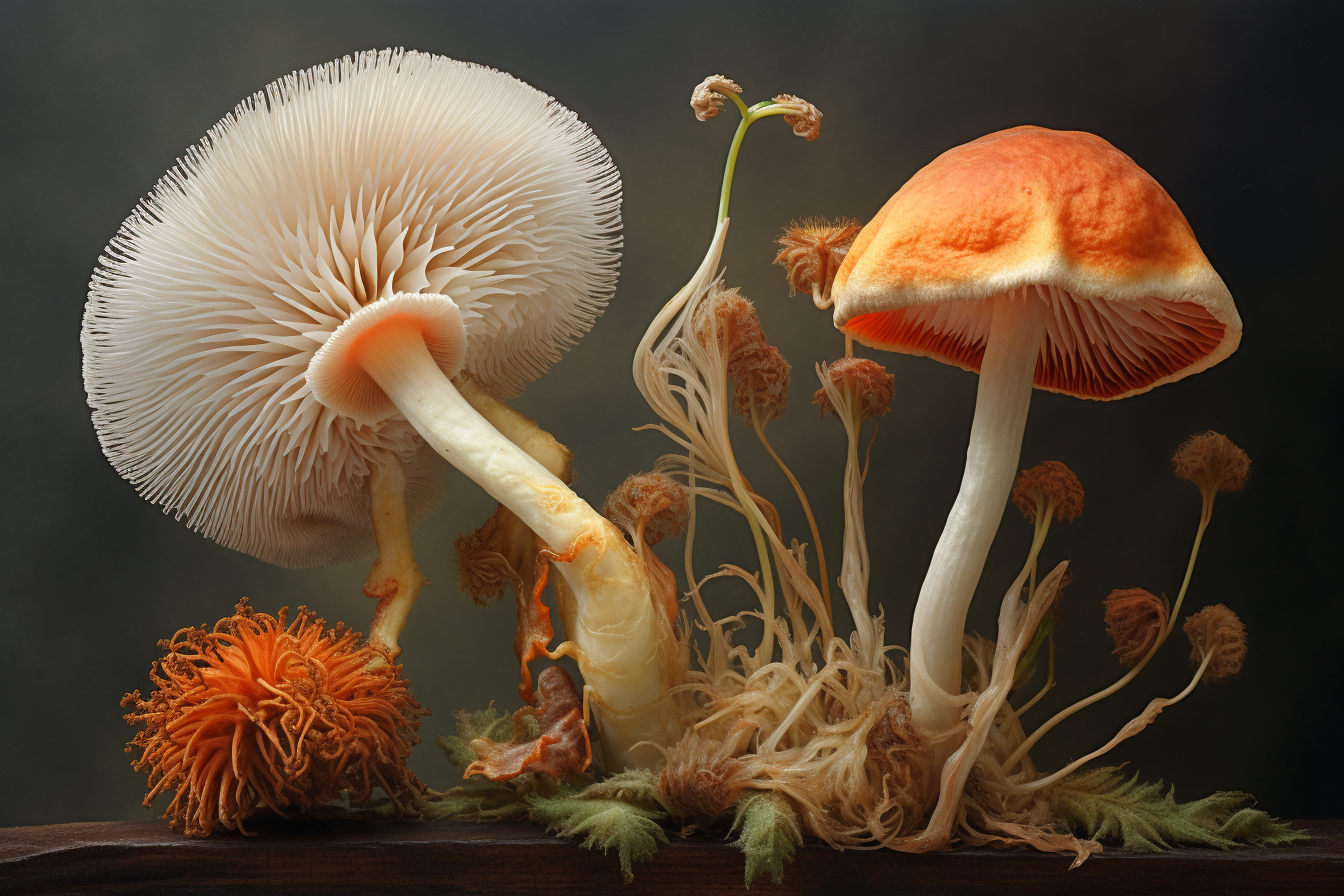
All Medicinal Mushrooms Provide the Same Benefits
Well, blow me down! Contrary to popular belief, not all medicinal mushrooms are cut from the same cloth. Each variety carries its own bag of tricks – a unique profile of benefits and side effects. You can no more lump them all together, then you can cats and dogs!
Starting with Chaga which, reputedly, packs a wallop with antioxidants, to Reishi which is known for its stress-busting capabilities, it’s clear each species is as different as chalk and cheese. Let’s not forget Lion’s mane, which not only looks like it’s named, but also packs a punch with brain-boosting abilities.
- Chaga: High in antioxidants
• Reishi: Helps with managing stress
• Lion’s Mane: Enhances cognitive function
So, the next time you hear someone spewing the myth that all medicinal mushrooms offer the same benefits, shake your head and enlighten them with some botanical wisdom. Every shroom has its benefits, but they also come with their own unique side effects. After all, there ain’t no such thing as a free lunch.
Misconception about Reishi Mushroom and Lion’s Mane Mushroom
Well, hold your horses! I reckon there’s a heap of misconceptions about Reishi and Lion’s Mane mushrooms floating around there in the echoes of the internet, and it’s about high time we set the record straight. Now, I’m not pulling your leg when I say that these magic ‘shrooms aren’t just tasty treats that’ll add a zing to your spaghetti Bolognese. No siree, they’re loaded with potential health benefits that’ve turned them into the latest talk of the town. We’re talking better brain function, increased nerve growth, a stronger immune system – the list goes on. But, wait! Before you rush out and fill your shopping cart with as many as you can carry, it’s worth noting that they’re also tied to a handful of side effects. Whoa now, don’t let that get your goat just yet!
Like all good things, these mushrooms aren’t exempt from that ol’ see-saw of benefit and drawback. Sure, they have their upsides- they’ve been championed for improving overall wellness and boosting cognitive functions. But on the opposite scale, some folks have reported a spot of trouble with digestive issues, skin rashes, and dizziness after adding them to their daily intake. Despite these potential side effects, it’s important to remember these symptoms might just be your body’s way of saying, “Slow down, cowboy!” Moderation, after all, is key. So, rather than jumping the gun, why don’t we chew the fat over a few ways to get the most of these impressive fungi? Here are some bullet points to consider:
• Start with small doses and monitor your body’s reactions.
• Maintain a balanced diet to complement your mushroom intake.
• Finally- consult a healthcare provider before diving in on the mushroom bandwagon.
Listen, just because a prospect shines like a silver dollar, it doesn’t always mean it’s gold. Education, understanding, and a healthy dose of skepticism will go a long way in the world of health and wellness trends. Let’s be mindful of the mushrooms, folks!
Misunderstandings about Lion’s Mane and Cordyceps Mushrooms
Well, you might’ve heard quite a lot of conflicting stories about Lion’s Mane and Cordyceps Mushrooms. Some folks argue they are the magic bullet in managing several health conditions, while others, on the flip side, say their touted benefits are nothing more than ancient folklore. Truth is, these misunderstood fungi have been subject to a fair bit of misinformation, leading to unnecessary fear and skepticism.
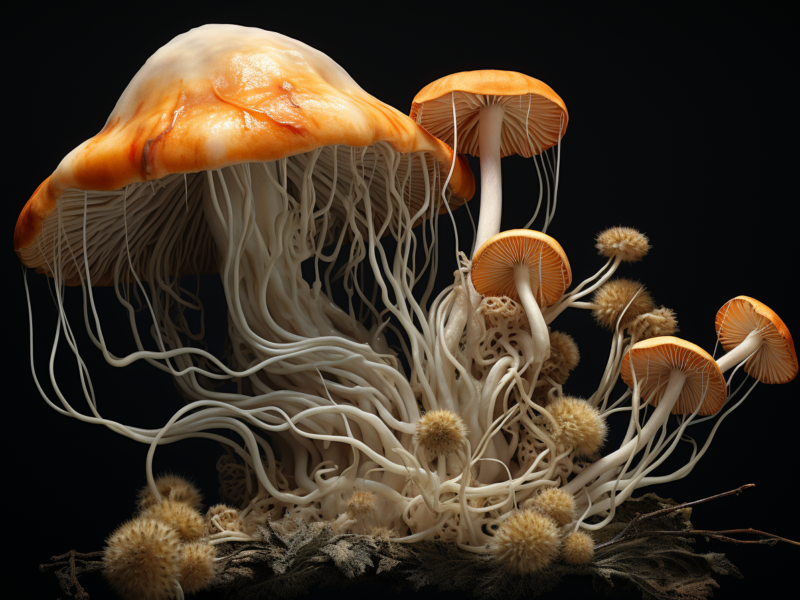
Oh, bother! Let’s cut right to the chase — the main misunderstandings revolve around two areas:
– **Benefits**: While it’s no secret the Lion’s Mane and Cordyceps Mushrooms boast a plethora of health benefits, it’s essential not to get carried away. Their abilities to support cognitive function or energy levels don’t mean they are wonder drugs for all ailments.
Sure, research confirms they can do a fine job of supporting our overall health, but they’re not some kind of modern elixir of life (as some would have you believe).
– **Side effects**: Meanwhile, people can get their knickers in a twist about the possible side effects of these mushrooms, which, won’t lie, exist. But, here’s the kicker! Most side effects are mild and relatively rare. So, it’s not as dramatic as some horror stories make it out to be. Y’know, balance is essential in life and it’s no different here: the benefits and potential risks of these mushrooms should be weighed up against each other.
The long and short of it is, misconceptions can breed unnecessary suspicion and fear. Chuck out these misunderstandings, and you’ll see that these nutritional powerhouses can indeed play a beneficial role in our wellness regimen, if used sensibly and realistically.
Misconceptions concerning the Potential Benefits of Lion’s Mane Mushroom
Well, you’d think with a name like Lion’s Mane Mushroom, it’s bound to have some pretty impressive benefits, right? Here’s the catch though – there are a slew of misconceptions hanging around out there like a bad smell, muddying the waters on the true potential benefits of this fascinating fungi. Frankly, I’ve seen more folks than I can shake a stick at, who believe this particular mushroom can work some sort of magic – from boosting brain power to belly busting weight loss. Well, hold your horses folks – it’s not all sugar, spice and everything nice. While the Lion’s Mane Mushroom does have several proven benefits, it’s no magic bullet. So before you start chowing down on these fuzzy fungi like there’s no tomorrow, be informed that they also come with their own side effects. However, let’s not throw the baby out with the bathwater. To nip any misleading information in the bud, here’s a simplified rundown of what we’re dealing with:- Proven benefits: Neuroprotective effects, immune system boost, and anti-cancer properties.- Potential side effects: Allergenic reactions, breathlessness and skin rashes. So, there we have it, folks, steering clear of the choppy waters of misconception, sure brings us to the calming shores of informed choices.
Lion’s Mane Mushroom Has No Medicinal Value
Well, blow me down, there’s a bucket load of folks out there singing the praises of the Lion’s Mane Mushroom, pumping it up as some sort of miracle cure-all. Truth be told, as far as credible scientific research goes, we’re still quite a ways from being able to substantiate any medicinal value for the feisty fungus. Whether it’s a spurious snake oil or a genuine health-booster remains a bone of contention, folks!
Now, don’t get me wrong, there’s a heap of anecdotal stories, an array of passionate testimonials singing the praises of the fungus’ benefits, from cognitive enhancement to anxiety alleviation. But here’s the rub – without concrete scientific back-up, it’s a stretch to endorse it fully. Moreover, one can’t just brush under the rug the side effects, like the reported upsets in the ol’ tummy or even allergic reactions. It’s all a bit of a catch-22 you see – while some folks may swear by it, others are left reaching for the Pepto-Bismol.
Ultimately, it’s something you gotta ponder on:
• Is the lack of sturdy scientific evidence a dealbreaker?
• Are the potential side effects worth the risk?
• Could the benefits, however anecdotal, outweigh the cons?
I reckon the final verdict ain’t out yet on Lion’s Mane Mushroom, and until then, it’s as clear as mud whether this food supplement is worth its salt, or just another element in the vast wilderness of questionable health fads.
Lion’s Mane and Turkey Tail Mushrooms Offer Similar Medicinal Benefits
Well, hold onto your hats, folks! This might just knock your socks off – Lion’s Mane and Turkey Tail mushrooms actually offer similar medicinal benefits. Now, I know what you’re thinking, “What in the world could a lion’s mane have in common with a turkey’s tail?” But get this, we’re not talking about the actual creatures here. Instead, we’re venturing into the mystical world of fungi, where these two delicacies command immense respect due to their impressive health-boosting qualities. Oh boy! The benefits these two champs dish out are mind-boggling. Lion’s Mane, for instance, is not just showing off with its glorious, mane-like appearance.
For starters, it’s been lauded for its neuroprotective properties, potentially putting up a valid arm wrestling against neurodegenerative diseases. Turkey Tail, on the other paw – or should I say feather – while it may not have the eye-catching allure of the Lion’s Mane, packs a serious punch with its abundance of antioxidants. Alas! Every rose has its thorns, and alongside the amazing benefits, there can be some side effects including upset stomachs.
So here’s the skinny, folks:
– Lion’s Mane: boosts cognitive function, could slow Alzheimer’s progression, but may cause itchy skin.
– Turkey Tail: heart-healthy, might help fight off cancer cells, but can lead to darkened nails.
Just remember, don’t go by the names alone and judge a book by its cover; these fungi are some genuine diamonds in the rough!
Conclusion
In conclusion, consideration of both benefits and side effects is essential when assessing any course of action, as it brings a comprehensive perspective of the overall impact.
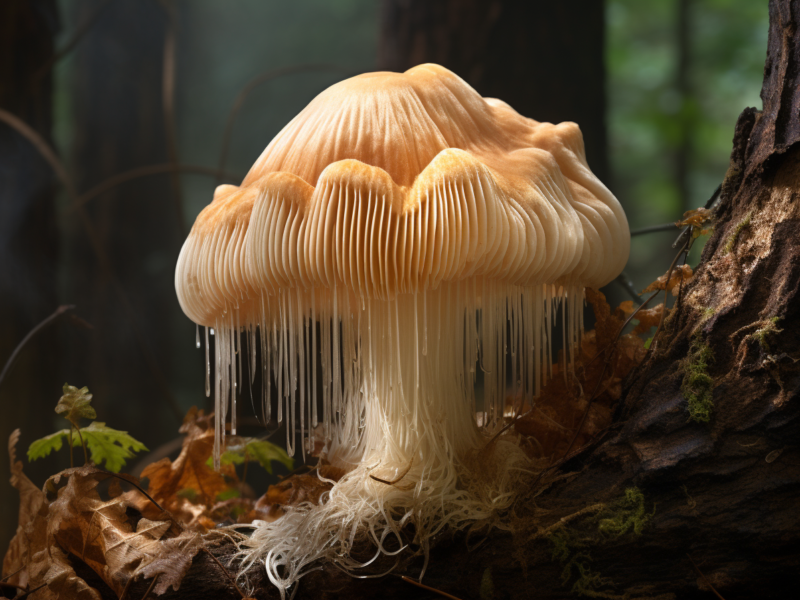
The benefits often include positive outcomes such as increased efficiency, improved well-being, boosted productivity, and financial growth.
They present compelling reasons to embark on a particular path, providing motivation and assurance of a desirable return.
However, paying attention to the potential side effects is equally important.
Side effects, while often not intended, can carry considerable consequences that might outweigh the perceived benefits. These could range from health risks to financial losses, sometimes leading to long-term damage.
Hence, an inclusive understanding that encompasses both benefits and side effects ensures a well-rounded evaluation, minimizing surprises and unanticipated repercussions. By weighing these aspects, it becomes possible to formulate better strategies, make informed decisions, and ultimately, secure more favorable outcomes. This balance is a pivotal strategy in risk management, guaranteeing a broader view and facilitating a pragmatic and responsible approach to decision-making.
FAQ’s:
Q1. What are the benefits of Lion’s Mane?
A1. Lion’s Mane has been found to have many potential benefits, including improved cognitive function, enhanced nerve growth, and anti-inflammatory and antioxidant properties.
Q2. Are there any side effects of Lion’s Mane?
A2. While Lion’s Mane is generally considered safe, some people may experience mild side effects such as nausea, dizziness, and stomach upset.
Q3. What are the potential health benefits of Lion’s Mane?
A3. Lion’s Mane has been found to have potential health benefits, including improved cognitive function, enhanced nerve growth, and anti-inflammatory and antioxidant properties.
Q4. Is Lion’s Mane safe to consume?
A4. Generally, Lion’s Mane is considered safe to consume. However, some people may experience mild side effects such as nausea, dizziness, and stomach upset.
Q5. What are the myths and misconceptions about Lion’s Mane?
A5. Common myths and misconceptions about Lion’s Mane include that it is a hallucinogenic mushroom, that it can cause cancer, and that it can cause liver damage.
Q6. Is Lion’s Mane a hallucinogenic mushroom?
A6. No, Lion’s Mane is not a hallucinogenic mushroom. It is a medicinal mushroom that has been found to have potential health benefits, including improved cognitive function, enhanced nerve growth, and anti-inflammatory and antioxidant properties.
Q7. Can Lion’s Mane cause cancer?
A7. No, there is no evidence to suggest that Lion’s Mane can cause cancer. In fact, some studies have suggested that Lion’s Mane may have anti-cancer properties.


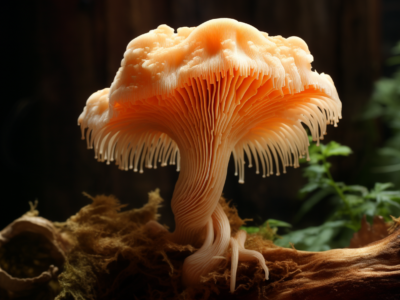
 Dinner Ideas For Lion’s Mane Rich Meals
Dinner Ideas For Lion’s Mane Rich Meals
